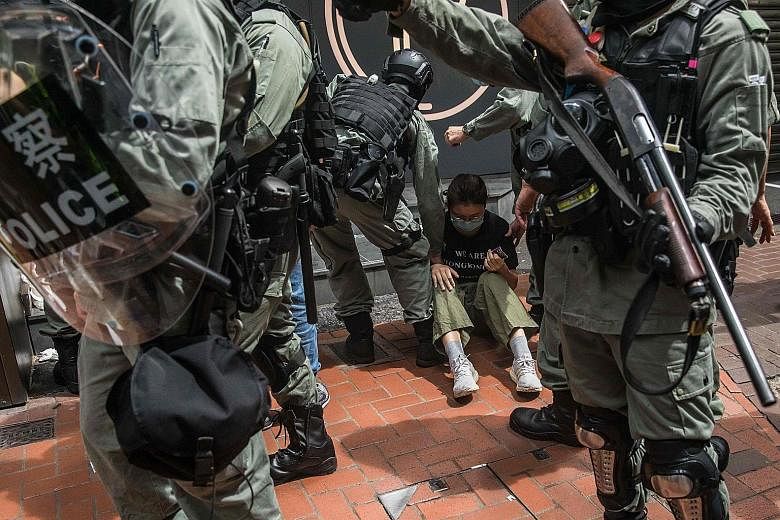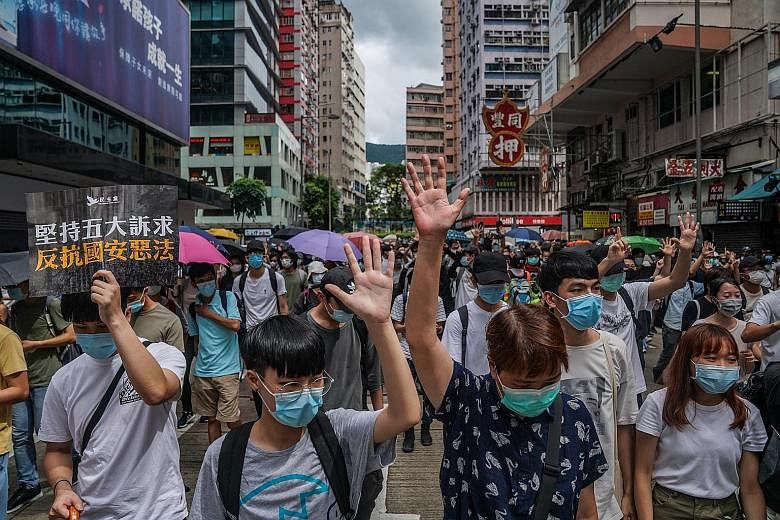In scenes reminiscent of anti-government protests a year ago, Hong Kong police fired tear gas and pepper balls, and deployed one water cannon to disperse thousands of defiant demonstrators yesterday on the anniversary of the handover to Chinese rule.
Protesters took to the streets to vent their anger at Beijing's passing of a sweeping national security law for the territory.
The police said 10 people were arrested under the new security law that kicked in on Tuesday night.
More than 370 were detained for a range of offences, including unlawful assembly, obstructing the police and possession of weapons.
The first person held under the new law was a man who was caught holding a Hong Kong independence flag, the police said, adding that three others were nabbed for showing materials carrying Hong Kong independence slogans.
Secretary for Security John Lee yesterday defended the arrests at a briefing, saying it was "common sense" for residents to start abiding by the legislation the moment it came into effect.
Seven officers were injured in the day's operations and taken to hospital, the police said. The injuries included stabbing wounds, finger fractures and head injuries.
The Civil Human Rights Front, organiser of some of the city's biggest demonstrations, was banned from holding the annual July 1 march for the first time since the handover in 1997, but activists continued to urge peaceful marches anyway.
For hours yesterday, protesters played cat-and-mouse with the police in Causeway Bay, the traditional venue for large demonstrations, and Wan Chai, gathering, dispersing and regrouping when officers left the scene.
The protesters raised their hands to reflect their six demands, which include universal suffrage and an independent probe into allegations of abuse of authority by the police.
The demands originally numbered five, but have since expanded to cover a demand for the abolishment of the police force.

-
SOUND BITES
-
LIFE IMPRISONMENT AWAITS
The National Security Law for Hong Kong is not retroactive, and this makes 11pm, June 30, 2020 a watershed. Those who are aware of the current situation and change their course will be safe. As for those who continue to do evil, the National Security Law for Hong Kong awaits. The law carries a maximum penalty of life imprisonment - a tiger with teeth.
GLOBAL TIMES EDITORIAL
POLITICAL TOLERANCE
The implementation of "one country, two systems" in Hong Kong has demonstrated the political tolerance of the central government. (Different political parties) can still exist, or you can have different political views, including opposition to the government's claims. (Deng) Xiaoping said Hong Kong can still scold the Communist Party after its return, but that cannot be turned into action and a base against the mainland under the guise of democracy.
MR ZHANG XIAOMING, executive deputy director of the State Council's Hong Kong and Macau Affairs Office.
SANCTIONS AND ROBBERS
Some countries are threatening us with sanctions. I would say this is the logic of bandits.
MR ZHANG XIAOMING
FREE FROM INTERFERENCE
The Constitution of our country clearly stipulates that the people's courts and procuratorial organs independently exercise their functions and powers and are free from interference by any administrative organ, social group, or individual. This is a clear provision on the independent exercise of judicial power and procuratorial power in the entire country's rule of law.
MR SHEN CHUNYAO, vice-chairman of the National People's Congress Constitution and Law Committee.
LIMITING AUTONOMY
It's a big encroachment on the "one country, two systems" formula, it's the end of Hong Kong's high degree of autonomy. Not everyone will be extradited (for trial in the mainland), but we have mainland Chinese officials in Hong Kong and they are not accountable to anyone.
MR JEAN-PIERRE CABESTAN, Professor in Political Science, Hong Kong Baptist University.
They also chanted illegal pro-independence slogans and sang a prohibited protest anthem despite warnings from the police.
Shouts of "Liberate Hong Kong, revolution of our time" and "Hong Kong independence, only way out" rang out from across the streets.
Some protesters also blocked roads, obstructing traffic with dismantled railings and rubbish bins, and set fire to barricades.
Hours before the demonstrations began, Hong Kong leader Carrie Lam attended a reception to mark the 23rd anniversary of the hand-over from British to Chinese rule where she hailed the passing of the law as a turning point for the city.
"The legislation of the national security law is considered the most important development in relations between the central government and Hong Kong since the handover," Mrs Lam said, stressing that it targeted only an extremely small number of people.
The city's Chief Executive, who has two years left in her five-year term, was visibly emotional as she recounted how the past year had been the most challenging in her career as she faced vicious personal attacks, while worrying about Hong Kong's future.
The chief of Beijing's liaison office in Hong Kong, Mr Luo Huining, said having the law would help the territory move from chaos to order.
He said that the central government had not imposed taxes on the city and instead rolled out a series of beneficial measures which showed that it meant well.
The speeches came after dozens of officials and guests, including former Hong Kong leaders Tung Chee Hwa, Leung Chun Ying and Donald Tsang, Chief Justice Geoffrey Ma and Mr Luo, witnessed the annual flag-raising event at Golden Bauhinia Square.
At a briefing on the new law yesterday, Justice Secretary Teresa Cheng said suspects linked to cases in "complicated situations" would be tried in a mainland court under mainland law. But, she said, once a suspect was handed over to mainland authorities, it would be up to the courts there to decide on the appropriate penalty.
Under the new law, the maximum sentence for the most severe cases is life imprisonment.



